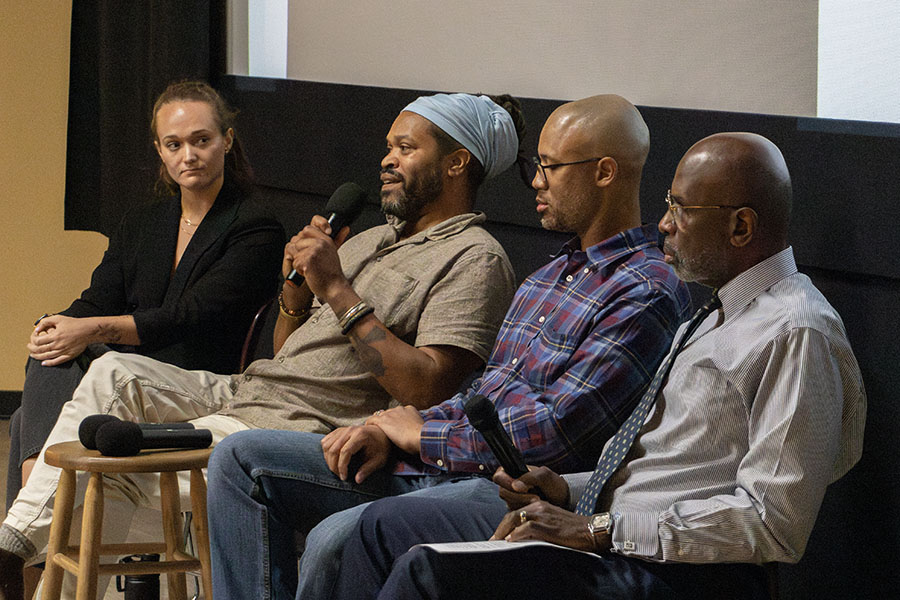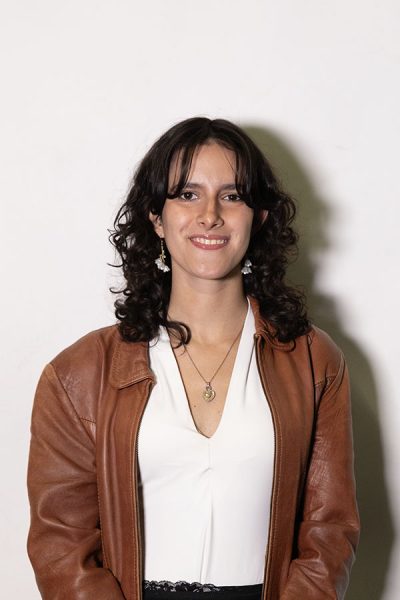As the nation faces a housing crisis with some of the highest 30-year mortgage rates in decades and with elections right around the corner, Elizabeth Barrett’s documentary “Divisible” reminds audiences of a major housing factor: redlining.
Redlining refers to the practice in which residents of different areas are denied access to services such as mortgages, insurance and other financial resources, primarily based on the residency of people in minority neighborhoods. In the 1920s, the government developed color-coded maps — such as one used in Syracuse — depicting the loan-worthiness of neighborhoods. Red was used to mark areas not worthy of loans, which were predominantly Black neighborhoods. Redlining can withhold crucial services, like grocery stores and health care.
On Sept. 12, Cinemapolis hosted a screening of the documentary “Divisible,” which focuses on the historical and contemporary impacts of redlining in the U.S., highlighting the city of Omaha, Nebraska. The documentary also explores how the community continues to be affected by these decades-old systems and why anti-discriminatory laws have not fully addressed its impact.
As a first-time director, producer and cinematographer, Barrett said she started the filming process in the summer of 2020 with no idea what the end product would be. She said that through her conversations with many residents of Omaha and professionals in the area, her inspiration developed.
“When I started … I really didn’t know anything about [redlining],” Barrett said. “It was really eye–opening to me … [that] I was able to have a lot of conversations with people and talk about their life experiences.”
Barrett said that breaking into the movie industry with an independent film — which is such a gate–kept community — without any funding for the distribution of the film has become a big challenge in the post-production stage. “Divisible” has not been released anywhere officially, but has been shown in several festivals across the country.
“There are huge hurdles to getting things, especially something that could be ‘divisive’ — such as a film about social justice issues — into a mainstream space without any kind of big names attached to it or big funders attached to it,” Barrett said.
A governing board was created for members to share their expertise and experiences with redlining throughout the creative process. The governing board includes Schmeeka Simpson, the Rev. Nikitah Okembe-Ra Imani and Terri Crawford, J.D. Barrett said the board discussed funding early on and was cautious about where money was coming from.
“We didn’t want to be tied to an entity or body that was going to dictate how we could tell the story,” Barrett said.
Barrett said she wanted to distribute her documentary throughout higher education. She said she wanted to focus on audiences who are already interested in having conversations about these issues.
“That’s where we’re putting our efforts to begin,” Barrett said. “Students who are eager to learn … and avenues for reaching audiences where people can opt in is likely where we’ll get the most traction.”
Barrett said Ithaca was an ideal place to show the film because it is a college town with Cornell University, Ithaca College, Tompkins Cortland Community College and more surrounding community colleges.
“There’s so many young people who are already in the space of wanting to learn new information and who are likely going to go on to have careers in spaces that really directly interact with some of the things that we talk about,” Barrett said.
Barrett got connected with Jennifer Majka, director of Diversity and Inclusion at Charles H. Dyson School of Applied Economics and Management at Cornell University, who learned about “Divisible” and wanted to help get the initiative off the ground.
The DEI offices of SC Johnson College of Business, Bowers College of Computing and Information Science, CALS Agriculture and Life Sciences, College of Human Ecology and the Cornell library system sponsored the screening and the compensation for Barrett’s team.
Majka said that assuring that the screening was financially and locally accessible was a priority, which is why they opted for a local facility rather than Cornell’s campus. Majka said the board did not want the location to be a barrier for college students or community members.
“We didn’t want that to be a barrier for either IC students or community members to come up to the Cornell campus,” Majka said. “We had met with the State Theatre and with Cinemapolis, and decided on Cinemapolis … because we wanted to be able to fill it to capacity.”
The screening — attended by 115 people –– was followed by a panel discussion with Barrett; Eldred Harris, graduate of Cornell Law School, who serves on the ICSD Board of Education; Tyrell Stewart-Harris, lecturer in management communication and the writing program coordinator at Cornell University; and moderated by the Rev. Ken Clarke, director of the Tompkins County Office of Human Rights.
Harris, who grew up in New York City, said that despite having experienced the effects of redlining in the city before, he did not know the extent of its reach. “Divisible” opened his eyes to how it is reflected in Omaha and how Ithaca is not exempt from it either. Harris said a good example of redlining is the West Village in Ithaca.
“I’ve had dreams for years of getting high school students — particularly at [Lehman Alternative Community School] because they’re right there — doing a project of redlining in Ithaca,” Harris said.
The panel also discussed housing and gentrification in Ithaca. For example the Southside neighborhood, which has historically been a Black community for over a century, has been seeing displacement of people of color to low income areas. The “Greater Southside Neighborhood Plan” was released Dec. 19, 2018 as a plan of action to address this issue. Residents have been urging government officials to address racism as a stem of gentrification and identifying changes all around Ithaca to date.
In “Divisible,” Barrett highlights the need to reinvest in affected communities and address the ongoing effects of discrimination, whether in policies or access to resources. Barrett said it is important that the impacted communities are involved in reinvesting.
“I think the other part is not just what you’re reinvesting in, but who that’s for,” Barrett said. “If you can’t afford to pay rent … they’re not buying groceries out of Whole Foods.”
Barrett said the board is developing an accessible curriculum for elementary school through college and beyond, including DEI programs outside of education spaces.
“We’re trying to really beef up what we can be doing on the, ‘Here’s the information you need to know’ front,” Barrett said.
Majka said lending practices are still problematic, and she hopes that “Divisible” can help people see the present day impacts of redlining.
“I think a lot of people think this is a policy of the past and it has no relevance today,” Majka said. “But we are still seeing the impacts of what redlining has done to our communities.”















